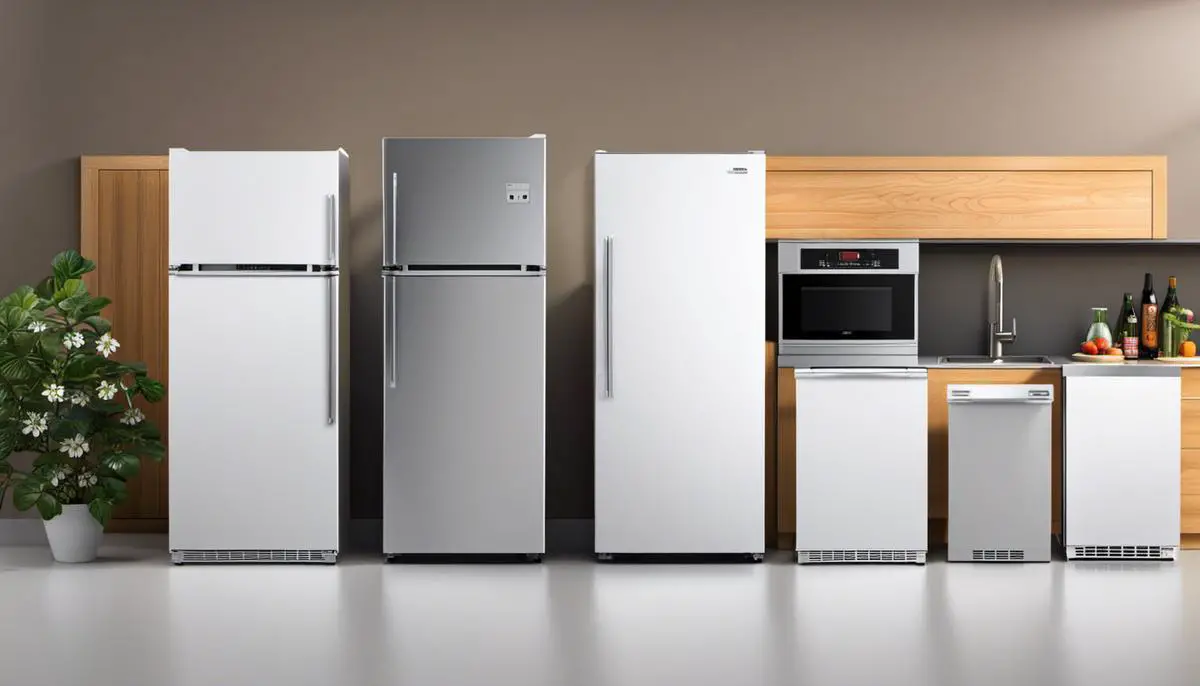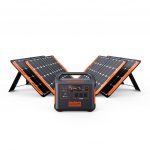Imagine the convenience of having a small refrigerator with a freezer that perfectly fits your living space, keeping your food and drinks chilled, preserved, and within reach.
Whether it’s for college dorm life, office use, small apartments, or even for an unobtrusive addition to a well-appointed home bar, the search can prove to be overwhelming. We take the guesswork out of it, providing a comprehensive look into what’s what in the realm of compact refrigerators with freezers.
We delve into detailed discussions on size and capacity, brand viability, energy usage, maintenance, and cost-benefit analysis to provide you with a well-rounded view of this vital appliance.
Table of Contents
Understanding Refrigerator Sizes and Capacity
Understanding Refrigerator Sizes and Capacity
When it comes to selecting the best small refrigerator with a freezer, appreciating the varying sizes, dimensions, and capacities is key. This not only guides your purchase but ensures it’s suited to your specific needs and usage patterns.
Small refrigerators with freezers come in various sizes, categorized generally as compact, mid-size, and large. Compact refrigerators, typically found in college dorms or office cubicles, can range in size from 1.7 cubic feet to 3.5 cubic feet. They are ideal for cooling salient items like beverages and small perishables.
Mid-size fridges are a step above compact refrigerators. While still small compared to full-size refrigerators, they have a capacity range of 7 to 10 cubic feet. This size is suitable for small apartments or condos with limited kitchen space but caters to more food storage needs than a compact refrigerator.
The large and small refrigerators with freezers essentially exist to serve those who need significantly more storage space. These models hover between 10 to 11 cubic feet, making them nearly as large as some full-sized fridges. They are perfect for individuals with heavy food storage needs but are still constrained by space.
Understanding the refrigerator’s capacity and space can guide you toward the best small refrigerator with a freezer for your circumstance. It’s also critical to think about energy efficiency and how the size of the refrigerator can affect your energy bills.
Insufficient space in your refrigerator can lead to poor air circulation and higher energy use. Therefore, matching the capacity with the number of people using it and their food habits becomes important.
Deciphering the refrigerator’s dimensions is another essential consideration. Do you have limited depth, width, or height in your space? The external measurements of refrigerators can vary as much as the internal ones. Therefore, when shopping, it is crucial to take physical measurements of your intended space to ensure a perfect fit.
Depending on the user’s needs and usage patterns, different refrigerator sizes and capacities will be more or less suitable. For a student, a compact refrigerator with a small freezer might suffice. However, in offices or small apartments, mid-size or large fridges with a freezer might be more appropriate due to a greater need for food storage.
Choosing the Ideal Small Refrigerator with Freezer
Grasping the different refrigerator sizes and capacities can greatly streamline your purchase process. It’s crucial to take into consideration your eating habits, your place of residence, your lifestyle, and the intended use before settling on a particular model.
An appropriate choice, in terms of physical fitting in your space and aligning with your lifestyle, can enhance the utility of your small refrigerator. Be it compact, mid-sized, or large – there’s an ideal small fridge with a freezer that suits your specific needs.
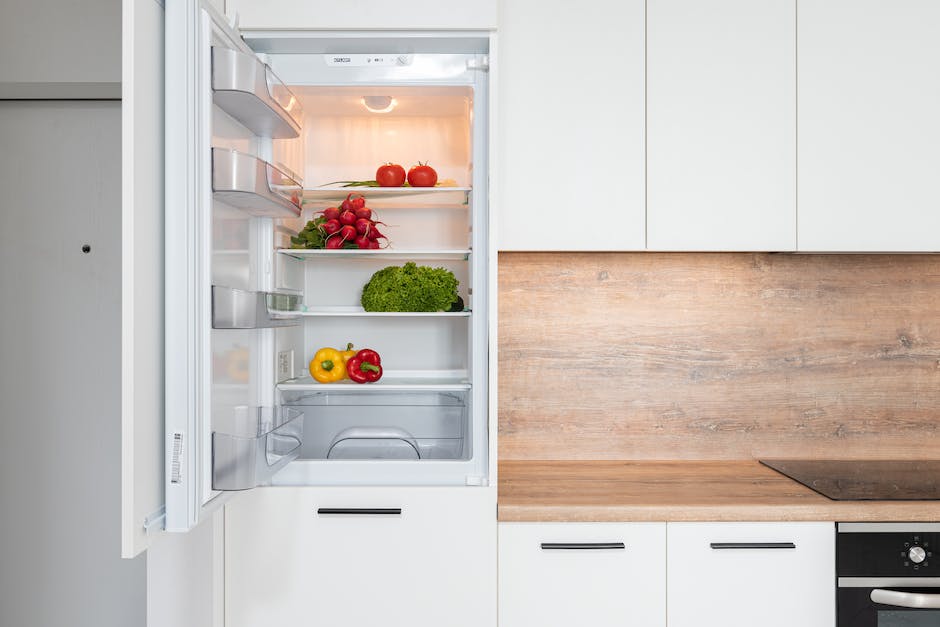
Exploring the Best Brands and Models of Small Refrigerators
Overview of Small Refrigerators with Freezers
Small refrigerators equipped with a freezer compartment are excellent alternatives for individuals with spatial constraints or those seeking energy efficiency. They prove to be incredibly handy in environments such as compact residences, dormitory rooms, personal offices, and recreational rooms.
Frigidaire EFR331: Compact and Efficient
The Frigidaire refrigerator model is a good embodiment of what a small refrigerator with a freezer should be. It has a compact design of 3.2 cubic feet and includes a dedicated freezer compartment. The separate freezer door is perfect for keeping your frozen goods at the ideal temperature.
The fridge also features an adjustable thermostat, allowing you to manage the temperature with ease. The energy efficiency and low noise levels further add to the convenience. However, some users note that the freezer compartment may not be enough for those needing more freezing space.
Blomberg Refrigerator
Another significant player is Blomberg with its BSBS2230SS model; it offers both fridge and freezer sections in a compact size. This model includes an exclusive Blue Light Technology, intended to prolong the freshness of fruits and vegetables, alongside an IonFresh Technology that removes bacteria and odors in the fridge. The key drawback with this model is its higher price point, making it less affordable for those on a budget.
Galanz Refrigerator: Style Meets Functionality
Galanz’s GLR31TBEER fridge model combines style and functionality with its standout retro design. Its impressive 3.1 cubic feet holds a separate freezer compartment up top. It’s Energy-Star certified, which means it consumes less electricity than many of its counterparts. Drawbacks include a lack of interior light and a lower freezing capacity than some models.
Daewoo Refrigerator RTE18GSBCD: Energy-Efficient and Spacious
Daewoo emerges as a promising brand with its RTE18GSBCD model termed the ‘Top Mount Refrigerator’. It features a sufficient 18 cubic feet capacity split between the refrigerator and freezer compartments. It stands out for its energy efficiency and its variety of compartments for organized storage. Nonetheless, the size of this model makes it less suitable for very compact living spaces.
Danby Refrigerator DCR031B1BSLDD: Compact and Versatile
Danby’s model DCR031B1BSLDD stands out as a small, versatile refrigerator-freezer. Suitable for tight spaces, the model includes a top-mounted freezer and offers 3.1 cubic feet of storage space. It tends to be more affordable than some other models while still providing a good range of features, including an Energy Star rating. However, some users have reported a loud noise level from this model.
Shopping for the best small refrigerator with freezer involves a careful evaluation of a variety of factors, from storage space and energy efficiency to cost considerations. Your choice will ultimately depend on your individual needs, so it’s important to know exactly what you want in a refrigerator before making a decision.
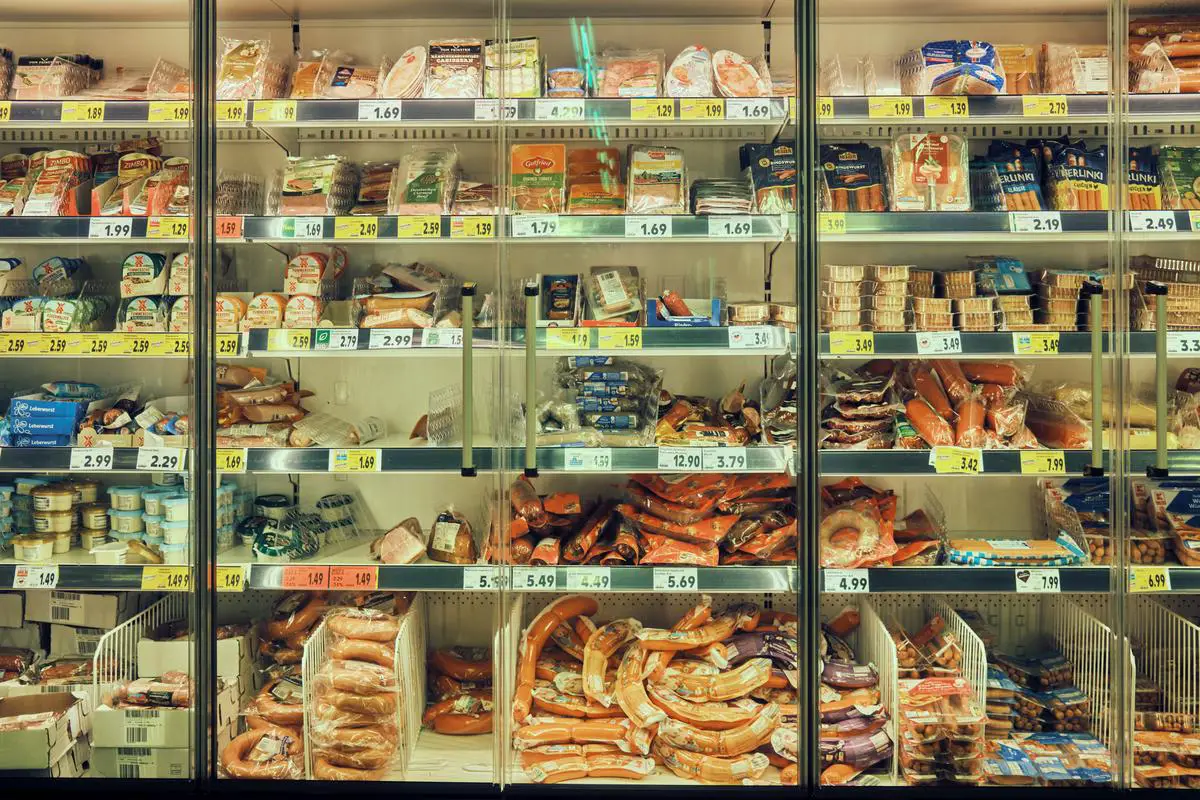
Photo by alanalves on Unsplash
Energy Usage and Efficiency
Understanding Energy Efficiency in Small Refrigerators with Freezers
Energy use and efficiency are key considerations when venturing out to buy a small refrigerator with a freezer. A refrigerator that’s energy-efficient doesn’t just contribute to a better, greener environment – it also helps cut down on your electricity costs, which makes it a key feature to consider.
These compact refrigerators, despite their small size, can sometimes have energy consumption rates similar to full-sized refrigerators due to the additional power needed by the inbuilt freezer.
The amount of energy used can also depend on other variables such as how often and how heavily the refrigerator is used, its design (like if the freezer is on the top, bottom, or side), how often the door is opened and shut, the insulation quality, and the temperature of the room it’s in.
Understanding Energy Star Ratings
The Energy Star rating is a crucial determinant of a refrigerator’s energy efficiency. The Energy Star rating is a certification program run by the U.S. Environmental Protection Agency (EPA) and the U.S. Department of Energy. Products with this certification are top-tier energy-efficient appliances. The Energy Star label guarantees energy efficiency, contributing to significant savings on electricity bills over time.
Refrigerators with the Energy Star certification use 15% less energy than non-certified models, according to EPA standards. In some models, an energy-saving mode is also available, which minimizes power consumption when activated.
Other Relevant Energy-Saving Certifications
Besides the Energy Star certification, additional certifications can indicate a refrigerator’s energy efficiency. For instance, the Consortium for Energy Efficiency (CEE) tier rating provides further insight into a refrigerator’s power usage performance. A higher CEE tier signifies superior energy efficiency.
Moreover, the Federal Trade Commission (FTC) mandates that EnergyGuide labels be affixed to all new refrigeration appliances. This label displays the estimated yearly operating cost, the estimated yearly electricity consumption and compares the appliance’s energy use to that of similar models.
Essential Factors in Selecting a Small Refrigerator with Freezer
Selecting the best small refrigerator with a freezer requires taking into consideration several components such as energy efficiency, size, aesthetics, special features, and cost. It’s worth noting that while energy-efficient models may have a higher initial price, their minimal energy usage could lead to substantial savings in the long run.
Models that stand out in efficiency ratings include the Midea WHS-65LSS1 Compact Refrigerator, the BLACK+DECKER BCRK17B Compact Refrigerator, and the Danby Designer DCR044A2BDD Compact Refrigerator. They offer an ideal balance of functionality and energy consumption, making them attractive options for those wanting to reduce both space and power usage.
In order to further enhance energy efficiency, search for refrigerators that are well-insulated to prevent cool air from escaping, thereby lowering the amount of energy necessary to maintain optimal internal temperatures. Added features such as automatic defrost also help prevent frost build-up, which could otherwise lead to elevated energy use.
Energy Star-certified models or those with high CEE tier ratings are typically the most energy-efficient choices. Nevertheless, your individual usage and lifestyle should also be taken into account, as these will directly impact the overall energy consumption of your chosen appliance.
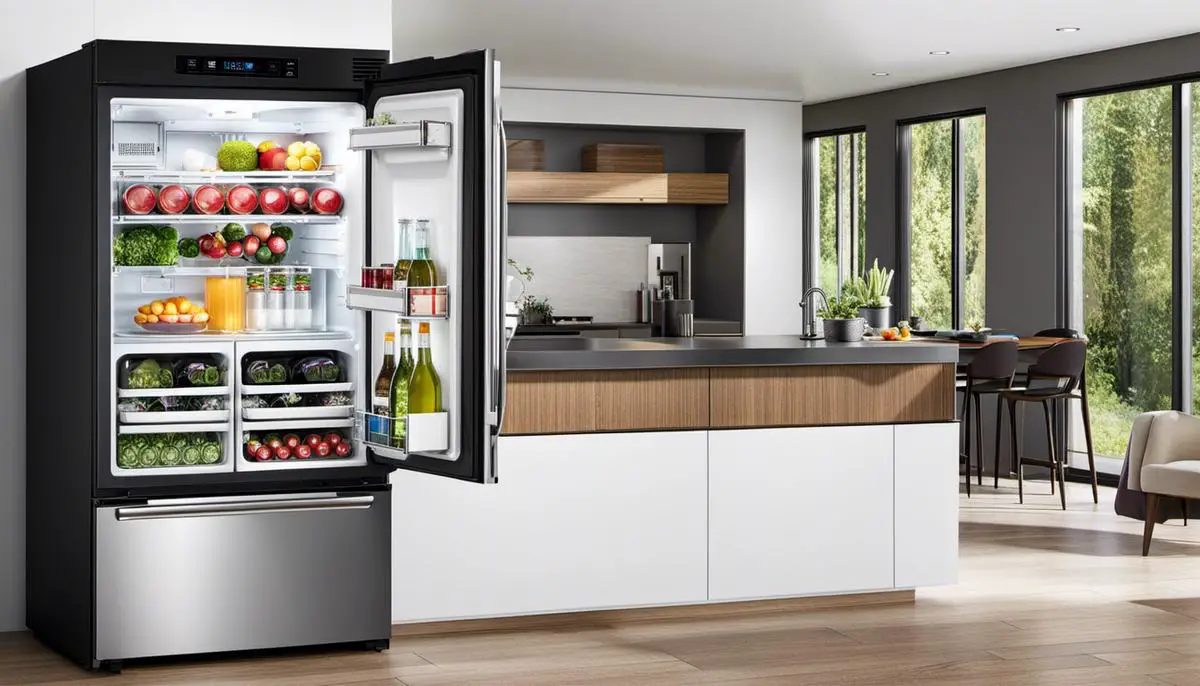
Maintenance and Care for Small Refrigerators with Freezers
The Importance of Regular Cleaning for Your Refrigerator and Freezer
The upkeep of a small refrigerator with a freezer greatly depends on routine cleaning. This not only prevents the growth of bacteria and the emergence of unpleasant smells, but it also keeps at bay the formation of ice. Ideally, a thorough clean should be conducted every three to four months or more frequently if required.
Prior to cleaning, the refrigerator should be unplugged and emptied completely. Each shelf, bin, and interior surface can then be cleaned with warm water and mild soap. Don’t overlook the freezer compartment, and avoid using aggressive or gritty cleaning agents that might damage the interior or destroy the finish.
Dealing with Frost and Ice Build-Up
Even with good maintenance, a small refrigerator with a freezer may accumulate frost over time, which is mainly due to the constant change in temperature and humidity. Freezers need to be defrosted whenever the frost build-up becomes ¼ inch thick.
To defrost, first, turn off the unit and remove everything from the freezer. To speed up the process, you can place a bowl of hot water in the freezer, replacing it when it cools down. Don’t try to chip away ice, as this may damage the freezer.
Ensuring Proper Ventilation
Make sure your small refrigerator with a freezer has enough space for proper ventilation. Most manufacturers recommend at least one inch of space on all sides. This allows for sufficient airflow around the unit, helping it run more efficiently and preventing overheating, which can damage the compressor and shorten the life of the appliance.
Checking the Door Seals
Regularly check the seals (also known as gaskets) on your refrigerator and freezer doors. These seals prevent cool air from escaping, ensuring efficiency. Dirt and grime can build up on these seals and cause them to fail. Clean them with warm, soapy water and check for any signs of wear or damage. If there is a tear or the seal is loose, it might be time to replace it, as it can affect the energy efficiency of your unit.
Monitoring the Temperature
Proper temperature settings help keep your food fresh and your appliance running well. The refrigerator should be kept between 37 and 40 degrees Fahrenheit, and the freezer should be at 0 degrees Fahrenheit. Minor fluctuations might occur, but if you notice a constant change, this could indicate a problem with the temperature controls or the cooling system.
Avoid Overloading the Refrigerator and Freezer
Overloading your small refrigerator with a freezer can not only make it hard for cool air to circulate, but it can also put a strain on the compressor, causing it to work harder. This can lead to increased energy consumption and possible breakdown of your unit. Instead, try to keep your refrigerator and freezer moderately filled to maintain optimal efficiency.
Troubleshooting Tips for Small Refrigerators with Freezers
Problems with your small refrigerator with a freezer can often be resolved with simple troubleshooting. If you find your unit isn’t cooling effectively, make sure to inspect the coils at the back of the fridge.
When coated in dust or debris, they can hamper the unit’s ability to cool efficiently. Similarly, if your refrigerator is displaying unusual noises or has halted completely, examine the power source and the settings. Conducting these minor checks can potentially spare you the hassle and costs of professional help.

Price and Value: Cost-Benefit Analysis
Cost-Value Evaluation of Small Refrigerators With Freezers
Many small refrigerators with freezers at various price points are readily available in the market, ensuring that there’s an option to suit nearly every budget. However, the price tag should not be the only consideration when purchasing this essential home appliance. Keep in mind the capacity, energy efficiency, and other added features that the unit offers as part of your cost-value assessment.
Analyzing the Price Range
Small refrigerators with freezers typically cost between $100-$500. The cost usually correlates with the size of the refrigerator, the brand, and the extra features it provides. For instance, smaller compact models that are suitable for dorm rooms and office spaces may fall within the lower end of the price range. Slightly larger models with separate freezer compartments and advanced features tend to be more expensive.
Balancing Price and Capacity
An important factor to consider alongside price is capacity. Compact refrigerators can range from 1.7 cubic feet up to 4.5 cubic feet or more. If you primarily plan to use the refrigerator for beverages, a smaller model may be sufficient. However, if you intend to store meals, frozen foods, or larger quantities of items, you should consider models with a larger capacity.
Larger models are typically more expensive, but they offer more storage flexibility and could potentially save you money in the long run by reducing the frequency of grocery shopping trips.
Considering Energy Efficiency
Another essential factor to consider when examining the cost vs. benefit of a small refrigerator with freezer is energy efficiency. Look for models that are Energy Star certified. These models use less electricity, leading to lower utility bills. While Energy Star-certified models might be more expensive upfront, the energy savings, in the long run, could well balance out the initial cost.
Evaluating Additional Features
Lastly, you need to assess the value of additional features. Do you need a model with a separate freezer compartment? Or would you prefer an in-built ice maker or water dispenser? Perhaps adjustable shelving for better storage organization is important to you. All these features add to both the usefulness and the cost of the refrigerator. Therefore, carefully evaluating your needs versus your budget can help you make the most cost-effective choice.
In conclusion, consider the capacity, energy efficiency, and additional features of a small refrigerator with freezer along with the price to make the best-informed decision. Remember, the most expensive model isn’t always the best value, and the cheapest model might not meet your needs. Your ideal small refrigerator with freezer should be a balance of both price and inherent value.
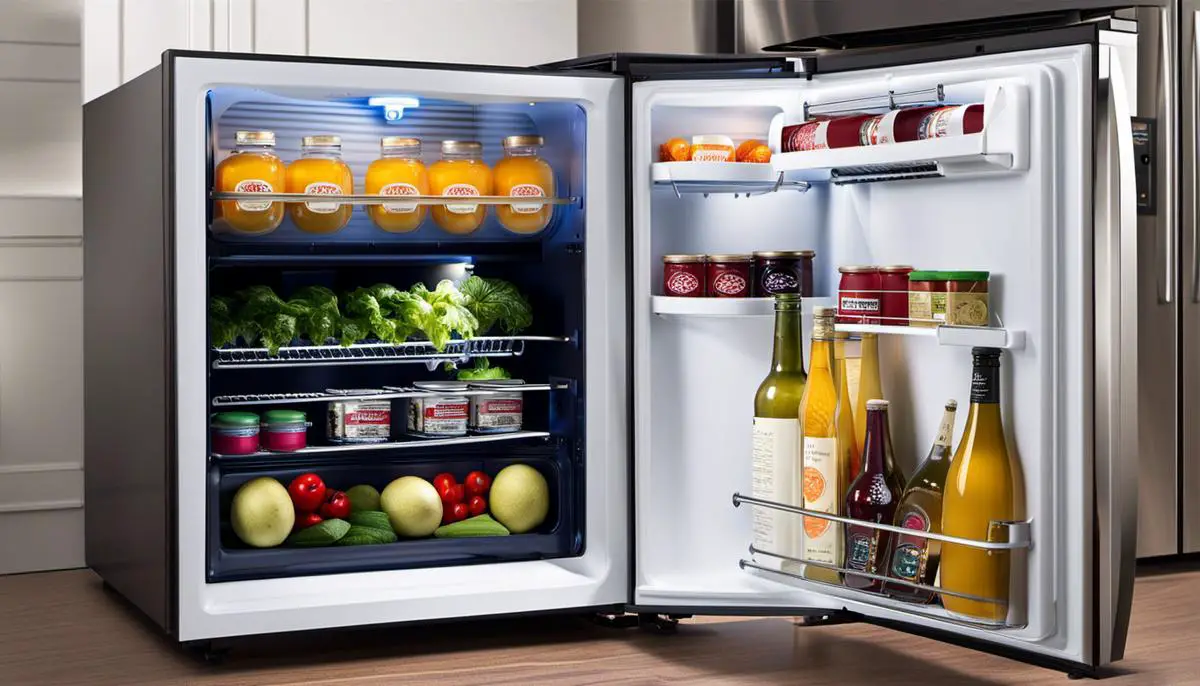
At the end of the day, the best small refrigerator with freezer is the one that meets your specific needs in the most efficient way. It’s not just about getting a high-ranking brand or the most energy-saving model but also choosing one that matches your personal habits, spatial constraints, and budget.
Finding a balance between price, size, energy efficiency, and maintenance requirements can help you enjoy the convenience of a personal fridge-freezer for years to come. Remember, the right choice for you may not be the most expensive or the largest one, but the one that optimizes your daily routines.

